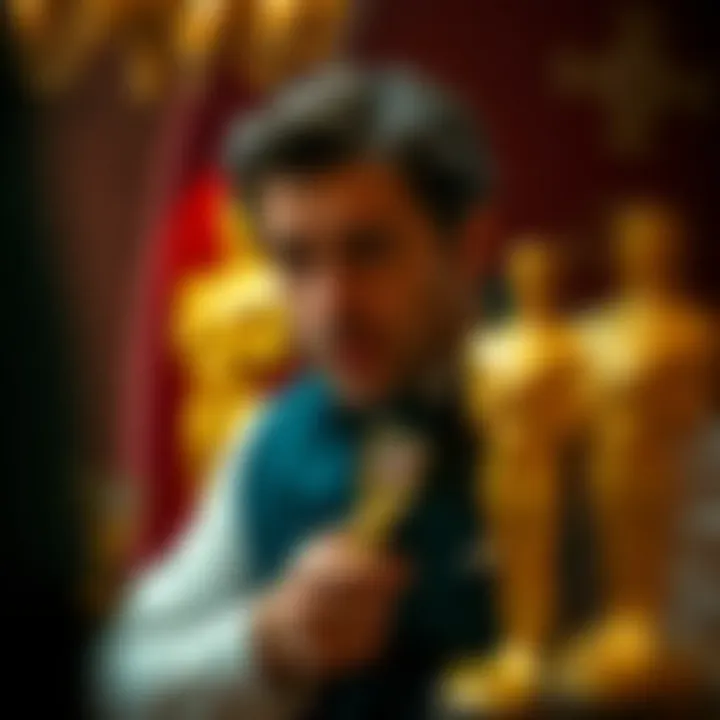Oscar Best Actor Odds: Analysis and Insights


Intro
Understanding the world of Oscar Best Actor odds is much like sifting through the fine grains of sand at the beach; it requires patience, insight, and a bit of luck. The annual procession of film awards attracts not just cinephiles and industry insiders, but also a diverse crowd of gambling enthusiasts eager to stake their claims on who will take home the coveted golden statuette. This intricate dance of cinema and betting isn't merely a pastime; it’s a blend of artistry and strategy that can lead to substantial returns if approached wisely.
As we navigate the ebbs and flows of the Oscars, it's essential to recognize that the odds associated with the Best Actor category are influenced by a multitude of factors that extend beyond mere box office numbers and audience favorites. The Academy’s voting patterns, the emotional weight of performances, and even the prevailing social narratives all play pivotal roles in shaping these odds. Whether you are a newcomer eager to grasp the basics or a seasoned gambler looking for strategic advice, this article aims to peel back the layers of this fascinating subject.
Key themes we will explore include:
- Historical trends that inform current odds
- The impact of personal and public perception on performances
- Effective strategies for approaching your bets
- Making sense of responsible gambling in this context
By the end of our analytical journey, both casual fans and dedicated bettors will walk away with a richer understanding of not just the odds themselves, but of the artistry behind the performances that make these competitions so gripping.
Prelude to Oscar Best Actor Odds
Oscar Best Actor odds are more than just numbers tossed around by betting enthusiasts. They represent the confluence of talent, perception, and timing within the dramatic tapestry of Hollywood. Understanding these odds is essential not only for gamblers but also for those who appreciate the craft of acting and the prestige associated with the Academy Awards.
Why are these odds significant? For one, the Oscars serve as a reflection of cultural values and societal shifts. Each year, performances that resonate with audiences and critics alike come to the forefront. These performances can influence the outcomes of not just the awards, but also the careers of the actors involved. Consequently, betting on the Best Actor category can be seen as a way to engage with the evolving conversation around art and recognition in cinema.
In recent years, the interplay of social media, critical acclaim, and audience reception have created a dynamic betting landscape. Bettors increasingly rely on data, trends, and expert insights to make informed decisions. Understanding this landscape involves recognizing that odds fluctuate based on various factors, including industry politics and last-minute buzz surrounding performances.
Key Considerations
- Predictive Nature: The odds provide insights into which performances are currently favored and how public sentiment evolves as the awards season progresses.
- Cultural Indicators: By analyzing trends within the Best Actor category, one can glean information about broader cultural movements and shifts in societal appreciation for different types of storytelling.
- Strategic Insights: For bettors, knowing how odds are calculated can lead to more effective strategy development, whether one is betting casually or more seriously.
As we proceed through this article, we’ll delve deeper into historical context, methodology, and current contenders, allowing you, the reader, to navigate the world of Oscar Best Actor odds with a well-informed perspective.
Historical Context of Oscar Best Actor
Understanding the historical context of the Oscar Best Actor category is essential not just for aficionados of film but also for those interested in the nuances of betting on such awards. The Best Actor award is emblematic of both cinematic achievement and cultural sentiments at the time of each ceremony. Its evolution over the decades reflects shifts in audience preferences, societal norms, and the film industry itself.
One of the benefits of exploring this context is that it highlights patterns and trends that can inform predictions and betting strategies. By examining past winners and the rationale behind their victories, bettors can gain insights into what factors might influence the outcomes of future awards. Additionally, many contend that understanding the backdrop against which these decisions unfold adds depth to the viewing experience, making it not just about the films but the societal implications they carry.
Evolution of the Awards
The Academy Awards were first held in 1929, and the Best Actor category has undergone considerable transformation since then. Initially, the award was somewhat undefined, with actors winning for performances that might not hold up under today's criteria for excellence. For instance, in 1930, the award was given to Emil Jannings for his roles in "The Last Command" and "The Way of All Flesh.” At the time, the award's criteria were loose, often driven by studio interests as much as by true performance merit.
Over the years, the Awards industry matured. Changes highlighted a shift towards more nuanced performances that reflected the complexity of human emotion. We saw actors like Jack Nicholson and Daniel Day-Lewis redefine the standards of acting, with transformative performances that transcended the mere act of acting and ventured into the realm of the profoundly human experience.
With each passing decade, new styles emerged and the Academy's zeitgeist shifted; hence, performances that might have been praised in one era could be overlooked in another. The formation of various voting blocks within the Academy has also contributed to differing perspectives, effectively showing that the zeitgeist can influence which performances resonate most strongly with voters.
Notable Wins and Losses
When looking back on notable wins and losses, we see clear instances of how unpredictable the awards can be. A perfect example is the 1994 Best Actor award, where Tom Hanks clinched the Oscar for his remarkable portrayal in "Forrest Gump," while many believed that he could have easily been bested by the heavyweights of that year, like Paul Newman in “Nobody's Fool.”
Similarly, one cannot overlook the losses that often make headlines—for instance, Glenn Close has paced the nominations tally without an Oscar win, a fact that stirs up debates among betting circles about potential dark horses in any given year.
"The Oscars don’t just showcase who acted well. They unveil a culture's prevailing sentiments and what it reveres at that moment, for better or for worse."
When analyzing past results, one must consider how certain performances gained traction amidst particular social trends. These trends could drastically affect an actor's odds leading up to the big night. Such historical context, therefore, lays a foundation for observing current contenders and understanding their prospects in relation to past dynamics, presenting valuable opportunities for informed betting.
The Betting Landscape
In the realm of film awards, the Oscars hold a unique position. As the pinnacle of recognition for cinematic artistry, the Academy Awards, particularly the Best Actor category, sparks significant interest among both film aficionados and betting enthusiasts. This interest is not merely due to the prestige of the accolades, but also the potential it offers for those willing to place a wager. The betting landscape surrounding the Oscars can mirror aspects of traditional sports betting, with intricate odds reflecting various factors that influence the award outcomes.
The significance of understanding the betting landscape cannot be overstated. Many enter this arena with high hopes of financial gain, but it's essential to recognize the dynamics at play that can influence the odds. Various normalized variables come into play, creating a complex web of analysis that bettors must navigate. Whether influenced by performance capabilities, audience reception, or even the political strife within the film industry, these elements work together to shape the betting odds that are available each year.
Understanding Betting Odds
Grappling with betting odds presents a unique challenge, especially within the Oscar context. Odds serve as a metric, reflecting the perceived probability of a particular actor winning the award. These are calculated based on a wide array of inputs, from historical performance data to current public sentiment. Bettors see the value in grasping these odds, as it provides them an edge in wagering decisions. Understanding how odds fluctuate during the months leading up to the ceremony can offer profound insights for prospective gamblers, ensuring that their bets are informed by a comprehensive understanding of the scenario.
Key Factors Affecting Odds
Critical Acclaim
Critical acclaim plays a significant role in shaping the landscape of Oscar nominations and, consequently, the betting odds. When a performance garners widespread admiration from industry critics, it elevates the perception of the actor's work. This acclaim not only resonates with audiences but also triggers a ripple effect among award voters, enhancing the actor's chances of landing a nomination and possibly winning. The key characteristic of critical acclaim is that it serves as a powerful endorsement, often outweighing other factors.
However, while critical acclaim is advantageous, it isn't the be-all and end-all. There are moments when an actor's performance receives acclaim but still falters during nominations due to other overriding sentiments or trends.
Award Season Momentum
Momentum during the award season can be a game changer in the Oscars betting landscape. As the various award ceremonies unfold—from the Golden Globes to the BAFTAs—the results create a momentum that can drastically sway the odds. An actor can gain traction, seeing odds improve remarkably if they start winning or receiving nominations leading to the Oscars. Award season momentum is crucial because it reflects not just the actor's performance but also the film's narrative as it permeates public consciousness.
On the flip side, momentum can be fleeting. An early favorite may lose steam if a rival performance gains unexpected momentum, showcasing the unpredictable nature of the award circuit.
Industry Politics
Industry politics adds another layer of complexity to the Oscar odds landscape. The interconnected relationships among actors, directors, producers, and voters can shape decisions in ways that transcend the narrative of performance alone. An actor's prior recognition, affiliations, or even controversies may sway voters, impacting the odds. The political aspect of industry sentiment is significant because it may diminish or amplify an actor's perceived chances far beyond their actual performance.
While industry politics can favor some individuals, it raises concerns regarding meritocracy. Voter biases can lead to unforeseen results, making this another factor bettors must navigate carefully.
Methodology of Odds Calculation


Understanding the methodology behind Oscar Best Actor odds is crucial for anyone looking to engage in robust wagering activities. This process encompasses a variety of factors and data points that serve to shape the betting landscape surrounding the annual Academy Awards. A strong grasp of this methodology enables bettors to make informed decisions while navigating the sometimes turbulent waters of this exciting intersection of film and betting.
The calculation of these odds is not merely a guessing game; it is a science built on statistics, trends, and the collective psyche of the viewing audience. As betters explore this field, they find themselves in a world where past performances can translate to future probabilities, and nuanced shifts in the industry often ripple through to the odds at hand.
Data Sources
When assembling the intricate puzzle that is the Oscar Best Actor odds, choosing the right data sources is of utmost importance. Various elements come into play — critical reviews, former winners, and even social media sentiment. These different inputs contribute uniquely to the differing perspectives offered.
- Critic Reviews: Trade magazines and websites often publish features on performances, which can set the tone for the expected odds. Critics may swing the momentum one way or another through their reviews. Resources like Rotten Tomatoes and Metacritic serve as vital platforms.
- Box Office Performance: Although not directly correlated, the financial success of a movie can influence perceptions of performance. The more watched a film is, the more weight voters may give to those acting in it.
- Industry Publications: Articles from sources like Variety and The Hollywood Reporter typically discuss trends and nominee predictions, which can shed light on underlying odds.
These diverse data points weave together a richer narrative, giving bettors more insight into how and why the odds are structured a certain way.
Statistical Models in Use
The framework of methodologies in odds calculation often employs several statistical models, which create an empirical basis for determining likelihoods of Academy Award outcomes. It’s not just gut feelings dictating the shifts in odds; data-driven techniques are the backbone of effective betting strategies in this domain.
- Regression Analysis: Utilizing historical data, regression models can predict outcomes based on past voting patterns. They can analyze trends over time, offering a detailed look at how various variables may impact awards.
- Machine Learning Algorithms: Advanced techniques such as neural networks can process vast datasets to highlight important trends and affiliations that a traditional linear model may overlook.
- Sentiment Analysis: With the help of natural language processing, analysts can gauge public sentiment from reviews, social media, and news articles. This can identify shifts in opinion that might not be captured through quantitative data alone.
Understanding these data sources and models is akin to reading the tea leaves. People need to combine empirical data with their instincts to get a feel for where the winds of Oscar odds might shift next.
Current Contenders for the Best Actor Award
The race for the Oscar Best Actor award is always a hot topic among film buffs and bettors alike. It’s not just about who delivered the best performance; it plays a significant role in shaping betting strategies and public perception. Having a keen eye on the current contenders helps bettors not only in understanding who might take home the golden statue but also in refining their betting decisions based on emerging trends.
Review of Leading Performances
Taking a closer look at the leading performances, it’s essential to assess the depth and range of each actor’s craft. This year, several actors have put in truly exceptional work that’s impossible to ignore.
For instance, James B. Washington's portrayal of a conflicted father in "The Depth of Shadows" has evoked profound feelings and sparked discussions about moral complexities in familial relationships. Meanwhile, Elena Montero's role in "Voices of the Lost" is another standout performance. Her ability to capture raw emotion while immersing the audience in a world of cultural turmoil showcases her talent and commitment to the role.
Reactions from critics play a weighty role in shaping public opinion. Reviews highlight not just the actors’ performances but also narratives that resonate on deeper cultural levels. The nuances in Elena's dialog and the physicality that James brings to his character create a compelling comparison, emphasizing their artistic capabilities. Such performances often get more than just surface-level praise, celebrating the transformative journeys undertaken by these actors.
Moreover, actors like Samir Drayton from "Conquest of Iron" are gaining momentum with some controversies. The mixed reviews might act as a double-edged sword—they could affect the odds. In betting terminology, one must weigh these performances carefully, as they can sway the odds in unpredictable ways.
Comparative Analysis of Actors
A comparative analysis among the actors making waves this awards season is pivotal for anyone involved in betting. Ratings, interviews, and social media buzz are essential indicators of an actor’s standing.
On one hand, James B. Washington and Elena Montero are leading the pack with their heartfelt performances. On the other hand, Samir Drayton and Willow Chen are similarly impressive, primarily focusing on transformative roles that challenge genre conventions. Their contrast is stark for the audience and bettors alike:
- James B. Washington
- Elena Montero
- Samir Drayton
- Willow Chen
- Film: The Depth of Shadows
- Key Strengths: Deep emotional range, complex character arcs
- Film: Voices of the Lost
- Key Strengths: Rich cultural narrative, captivating screen presence
- Film: Conquest of Iron
- Key Strengths: Controversial subject matter, bold acting choices
- Film: Outside the Grid
- Key Strengths: Bold narrative shifts, unique take on modern issues
The breadth of performances varies greatly. Some actors might play low-hanging fruit roles with less gravitas, whereas others opt for projects that might not initially hold audience favor but offer a chance to overwhelm.
While making predictions, it’s wise to keep a keen eye on industry trends and reactions. Any patterns or shifts in sentiments from key industry players can radically change the landscape of Best Actor odds, as well as raise important considerations for potential bettors.
"Those who fail to keep up with the shifts in industry momentum may find themselves holding a losing ticket at the end of the night."
This insight is crucial, especially as the awards season heats up. For instance, observing which films or performances generate chat on social platforms might offer an edge. By marrying observation with instinct, bettors can better position themselves before the Oscar nominations are actually published.
Industry Influence on Predictions
The influence of industry dynamics on Oscar predictions cannot be understated. The Oscars symbolize more than just artistic achievement; they reflect intricate social structures and relationships within Hollywood. For gamblers, understanding these dynamics is crucial, as they play a vital role in shaping the betting odds for the coveted Best Actor award.
Industry opinions can juxtapose rational assessment against emotional responses. Bettors who recognize this schism may find significant advantages in predicting contenders for the award. For instance, when certain films garner early buzz or when an actor's portrayal resonates deeply within the industry, these elements sway betting odds dramatically.
Furthermore, the industry is susceptible to trends and movements, including evolving themes in storytelling and talent recognition. These shifts not only dictate who receives nominations but also who ultimately takes home the golden statue. Knowing how industry insiders respond to performances—through critics’ circles, guild awards, and media coverage—can offer valuable insights into the trajectory of betting odds.
Critiques and Reviews
The reviews and critiques from film commentators and industry experts are often the first indicators of a performance’s reception. Following a film's release, reviews splashed across Rotten Tomatoes or discussed on Letterboxd can create ripples in the betting landscape. The tide can turn swiftly based on how a prominent critic perceives an actor's effort. For example, a rave review from a well-respected critic is likely to boost an actor's odds substantially.
Additionally, the disparity in critiques—from ecstatic praise to scathing reviews—offers gamblers intriguing opportunities to gauge the market. Critics who hold sway in industry circles may set the tone for what ultimately translates to nomination and winning potential, effectively altering odds. Key platforms where these discussions unfold include reputable outlets like Variety and The Hollywood Reporter, which provide analysis that bettors should track closely.
Award Circuit Trends
Beyond individual critiques, the broader award circuit dramatically influences Oscar predictions. The lead-up to the Oscars is a complex labyrinth of awards shows, including the Screen Actors Guild Awards and the Golden Globes. Each ceremony not only celebrates performance but also helps establish frontrunners based on audience and industry votes.
Adapting to trends in these circuits is essential for strategic betting. An actor who captures the Screen Actors Guild Award often gains momentum heading into the Oscars, shifting the odds in their favor. Bettors can strategically utilize this information, watching for patterns and tracking performances across various platforms.
Furthermore, this award synergy can groom expectations, shaping public opinion and ultimately impacting betting dynamics. As critics, previous nominees, and fellow actors weigh in, bettors glean insights into potential frontrunners. This interaction often leads to unexpected swings in odds, making it imperative for bettors to follow these trends closely.
Psychological Factors in Betting


Understanding psychological factors in betting is fundamental for anyone interested in Oscar Best Actor odds. Delving into the mindsets that influence betting decisions not only illuminates how odds are established but also reveals how they can sway bettors, whether seasoned or newcomers. There is a nuance in psychology that shapes behaviors and expectations, making this topic crucial for gamblers aiming to make informed choices.
As the betting landscape evolves, understanding these factors is beneficial for developing strategies that can counteract emotional impulses. Bettors often navigate a sea of uncertainty, influenced by data yet swayed by intuition. In this realm, self-awareness becomes paramount—appreciating one's biases, emotional triggers, and psychological pressures can aid in maintaining a level head.
Behavioral Patterns of Bettors
The behavioral patterns of bettors are as varied as the films celebrated by the Oscars. Understanding how individuals approach betting can offer significant insights.
- Risk Appetite: Some bettors display a penchant for high-stakes wagers, thrill-seekers who chase the excitement of potential winnings. Others are more conservative, preferring to hedge their bets and play it safe.
- Response to Wins and Losses: The emotional rollercoaster of wins and losses can skew judgment. A win might result in overconfidence, prompting reckless bets, while a loss can lead to desperate measures to recoup losses.
- Social Dynamics: Many bettors rely on peer influence, swayed by groupthink or popular opinion. These dynamics can sometimes obscure rational decision-making.
In essence, recognizing one's behavioral patterns can enhance betting strategies. It’s imperative for bettors to reflect on their motivations, which can significantly alter the effectiveness of their wagers.
Impact of FOMO (Fear of Missing Out)
FOMO plays a vital role in the betting world, often driving decisions that might defy rational thought. The nature of the Oscars, surrounded by media buzz and public scrutiny, amplifies this effect.
- Increased Pressure: As various actors garner attention for their performances, the buzz can create an overwhelming urge to participate in betting. Bettors fear being left out of the excitement, especially when friends or influencers vocalize their predictions and choices.
- Impulsivity: FOMO can lead to impulsive betting. Rather than evaluating the odds critically, bettors might jump on a trend simply because it’s popular at the moment.
- Market Reaction: When a notable performance gains traction, the betting market often reacts swiftly. This sudden swing can mislead bettors into making rushed decisions without proper analysis.
In this way, FOMO not only affects individual bettors but can also create ripple effects throughout the betting market, influencing the odds themselves.
Understanding these psychological aspects isn’t just a matter of curiosity; it’s a crucial part of developing a deeper, more adequate betting strategy. The intersection of psychology and betting behavior shapes how odds are seen and interpreted, ultimately affecting outcomes.
Responsible Betting Practices
In the world of Oscar betting, just like any form of gambling, it's essential to engage in responsible betting practices. It’s easy to get swept away by the thrill of the competition and the allure of potential winnings, but maintaining a clear head is vital to avoid pitfalls.
Effective responsible betting not only protects one’s finances but also promotes a healthier relationship with gambling. Bettors should be cognizant of their limits, understanding that the Oscars, while exciting, should never come at the cost of financial security or personal wellbeing.
Setting Limits
One of the first steps in responsible betting is to establish clear limits. It’s crucial to set both time limits and monetary limits before placing any bets. For instance, one could decide that they will only bet on Oscar nominees once a week, and the total amount wagered will not exceed a specific figure.
By doing this, gamblers can enjoy the excitement without letting it spiral out of control. Here are a few tips on how to set effective limits:
- Determine a Budget: Decide how much money you can afford to lose without impacting your daily life. This practice helps to mitigate risks.
- Track Your Bets: Maintain a record of your betting activities. This provides insight into your betting habits and helps in making informed decisions moving forward.
- Use Rewards Wisely: If your betting platform offers bonuses or promotions, use them sparingly as these can often lead to overconfidence and increased spending.
Recognizing Problem Gambling
Understanding the signs of problem gambling is equally as important as setting limits. In the rush of betting on Oscar favorites, it can be easy to overlook when things start to become unhealthy. Problem gambling can manifest in various forms, and recognizing these signs early can safeguard one against significant losses.
Here are a few tell-tale indicators:
- Increased Frequency: If you find yourself betting more often than intended, it may be a sign of losing control.
- Chasing Losses: Continuously betting to recover previous losses can lead to a vicious cycle, often exacerbating financial trouble.
- Emotional Distress: If betting starts to affect your mood, relationships, or daily responsibilities, it's time for a reevaluation.
Learning to recognize these behaviors is key, and seeking help from professionals or support groups when necessary is a prudent step. Remember, staying informed about gambling dangers is just as important as keeping up with Oscar trends and betting odds.
As the industry evolves, the responsibility also lies with each bettor to ensure they are participating in a safe and healthy manner.
For more resources about responsible gambling, visit National Council on Problem Gambling or the Gamblers Anonymous. Understanding how to bet responsibly ensures that the excitement of the Oscars remains an enjoyable and safe experience.
Future Trends in Awards Betting
The landscape of betting on award ceremonies like the Oscars is continuously evolving. A thorough understanding of future trends in awards betting allows both seasoned gamblers and newcomers to navigate the complexities of the betting market more effectively. As the industry is shaped by various factors, recognizing these trends not only enhances one’s ability to predict outcomes but also minimizes risks associated with uncertain stakes.
Emerging Technologies in Betting
One of the most significant influences on awards betting is the rise of emerging technologies. The betting industry has begun to integrate advanced algorithms and data analytics to refine odds calculations and predictions. For example, platforms like Betfair and DraftKings are leveraging machine learning to analyze vast data sets, which results in more precise and dynamic odds for bettors.
- Real-Time Data Analysis: Bettors can access insights that previously took days or weeks to compile, allowing them to make informed decisions almost instantly.
- Mobile Betting Apps: The proliferation of apps enables bettors to place wagers from anywhere, anytime, making it far easier to engage with emerging trends.
- Social Media Integration: Social platforms are becoming essential in shaping opinions about potential winners. Trends on Twitter or Reddit can influence public sentiment, which in turn impacts betting odds.
These innovations not only enhance user engagement but also improve the accuracy of the betting process, ensuring both operators and consumers are better informed than ever.
"The introduction of tech in betting systems allows for a more personalized and accessible experience. It's as if the odds are dancing around, adapting to what’s happening in real-time, rather than remaining static."
Changing Audience Dynamics
Audience dynamics within the awards betting community are shifting as well. As younger demographics become more involved, their preferences for interactive and engaging content are reshaping how betting platforms operate. Here are a few changes seen in audience dynamics:
- Diverse Betting Styles: The younger audience tends to favor social gambling, where interaction through platforms allows bettors to share insights and predictions.
- Increased Focus on Inclusivity: There’s a growing demand for more diverse and inclusive representation in both the nominees and the coverage surrounding awards, which impacts betting strategies. Bettors are now increasingly looking at performances that resonate with widespread cultural narratives.
- Informality and Accessibility: The shift away from elitist approaches has transformed the betting environment into something more informal. New bettors are entering the scene, underscoring the need for educational resources and user-friendly platforms.
These changing dynamics call for bettors to stay attuned to emerging trends, as this knowledge directly affects their strategies and potentials for winning.
The Role of Media Coverage
Media coverage plays an undeniable role in shaping the public's perception and understanding of the Oscars, particularly in relation to the Best Actor odds. In an age where information is abundant, how the media frames narratives around nominees, their performances, and the awards themselves can greatly influence betting behaviors and public sentiment. This section delves into the nuances of media coverage and its implications for gamblers and film enthusiasts alike.
Effects of Social Media on Perceptions
Social media has become a double-edged sword when it comes to Oscar coverage. On one hand, platforms like Twitter and Instagram give a voice to the masses. Many fans and film critics share their opinions in real time, which can rapidly shift the narrative around a particular performance. If a leading contender has a less favorable reception on social media, this can build negative momentum, influencing betting odds unexpectedly.
For instance, consider how regional trends can impact perceptions. A film resonates deeply in one community but fails to connect in another. The buzz, or lack thereof, can result in fluctuating odds that reflect the zeitgeist. Furthermore, hashtags can lead to campaigns that rally support for an underdog, effectively altering market sentiment and betting behaviors.


Mainstream Media Influence
While social media offers a platform for widespread opinion, mainstream media retains its authority in shaping perceptions through more curated narratives. Outlets like The New York Times or Variety provide reviews and critiques that set the stage for serious conversations around performances. These analyses bring credibility and depth, often serving as benchmarks for public taste.
Moreover, interviews, features, and profiles of the nominees add layers to the story, enabling audiences to connect on personal levels with the actors. High-profile journalists and industry experts have the power to legitimize certain contenders, amplifying their potential in the betting markets.
The interplay between mainstream and social media creates a complex landscape:
- Amplification of Narratives: What starts as a tweet can gain traction in traditional media, resulting in a cycle of reinforcement.
- Crisis Management: When a nominee faces backlash, mainstream outlets often step in to provide context or counter-narratives, influencing public sentiment.
- Visibility and Accessibility: Mainstream coverage can enhance visibility for lesser-known performances, potentially creating new betting opportunities for savvy gamblers.
In summary, the role of media coverage—both social and mainstream—is pivotal in the orchestration of public opinion surrounding the Oscars. It not only shapes perceptions but is also a key factor in determining the volatility of betting odds. As any experienced gambler knows, understanding these shifts can offer an edge in strategy. For further insights, consult sources like BBC or The Guardian for diverse perspectives on film awards.
"The chessboard of Oscar predictions isn't just about the nominees; it's also about the pieces moved by media."
Whether you're a seasoned bettor or a casual observer, keeping abreast of how these media narratives unfold will undoubtedly enhance your betting strategies.
Case Studies of Previous Oscar Winners
Exploring case studies of previous Oscar winners offers a treasure trove of insights into the intricate dance of talent, public perception, and market values in the realm of betting. Analyzing the trajectories of these illustrious actors reveals not just their personal achievements but the broader dynamics at play within the Oscars context. This examination helps bettors understand fluctuating odds while also shedding light on emerging trends that could shape future awards seasons.
Analysis of Iconic Performances
When deciphering the Oscar's pulse, it's vital to scrutinize iconic performances — the ones that stick like glue in collective memory. For instance, consider Daniel Day-Lewis's portrayal of Abraham Lincoln in "Lincoln." His transformative acting not only earned him the Oscar but also showcased how a single performance can affect not only an actor’s career but the betting landscape as well. This performance, rich in emotional depth and historical relevance, created waves that pushed his odds to rock bottom before nominations were even announced.
Another great example is Meryl Streep in "The Iron Lady." As she transformed into Margaret Thatcher, critics and audiences alike were swept off their feet. This led to a surge in her betting odds. Understanding these iconic performances allows bettors to forecast potential winners by analyzing how critical acclaim, audience engagement, and underlying themes resonate with both the Academy and betting markets.
“A stellar performance doesn't merely win awards; it can also set the stage for dramatic shifts in betting dynamics.”
Whenever you dive into any discussion about past winners, it’s critical to ask: What made these performances so resonate? Was it the director's vision? The complexity of the character? Or perhaps it was driven by societal issues at the time? All these elements matter, forming a mosaic of influences that shape the way accolades are awarded and, in turn, how betting odds are calculated.
Impact on Betting Odds
The ramifications of a standout performance are profound when it comes to betting odds. A recent case in point can be found in the awards season leading to Joaquin Phoenix's win for "Joker." Initially viewed as an underdog, his jaw-dropping acting not only captivated the audience; it flipped the odds on their heads, turning the tables on other frontrunners. When Chandler’s critics started raving over his role, the betting community took notice, and those early bets yielded substantial returns for some savvy gamblers.
Bettors should not merely react to the odds, but instead gauge the impact performances have on public perception and the betting landscape. Studying past winning odds often sheds light on the mechanics of shifts, revealing patterns that can aid in formulating strategic bets.
To encapsulate it, here’s a short list of key takeaways investors in Oscar odds should consider:
- The Role of Critiques: Reviews and critiques often serve as bellwethers for audience sentiment and can cause rapid changes in odds.
- Timing of the Win: Late-game performances often have stronger impacts on the odds than early season wins.
- Narrative Construction: The story surrounding an actor’s role can elevate their odds exponentially, especially if it resonates with current cultural movements.
Case studies of past Oscar winners don’t just offer a nostalgic look back; they function as an analytical tool that discerning bettors can use to make more informed decisions as they navigate the unpredictable waters of Hollywood’s most celebrated competition.
Cultural Significance of the Oscars
The annual Oscars ceremony stands as a cultural beacon, influencing not only the film industry but also the collective consciousness of society. Understanding the significance of this event enables both film enthusiasts and gamblers to gauge how performances resonate within the larger cultural framework. At its core, the Oscars symbolize the culmination of artistic expression, representing the ongoing dialogue between filmmakers and audiences across diverse backgrounds. The significance is layered, offering multiple benefits and considerations, especially in relation to Oscar Best Actor odds, weaving a complex tapestry of societal reflections and industry trends.
Reflections of Society
The Oscar winners often reflect wider societal attitudes and promote particular values that resonate with audiences. For example, the recognition of films focusing on social justice or personal identity can indicate shifting priorities among viewers and critics alike. When actors portray nuanced, powerful roles, they not only showcase their skills but also spark conversations about the issues at hand, shaping societal norms in the process. The way that these stories are told—the choices of who gets nominated and ultimately wins—can illuminate what society sees as worthy of recognition at any given moment.
Furthermore, the cultural footprint left by these awards compels viewers to confront their beliefs about representation and merit. This is especially pertinent in the context of Oscar Best Actor odds, as bettors must be attuned to these societal shifts to predict potential winners effectively.
"The Oscars do not just celebrate cinema—they hold a mirror to the world, reflecting its triumphs and tribulations."
In summary, the Academy Awards are more than mere accolades; they encapsulate cultural evolutions and can spark meaningful debates among audiences, ensuring that the cinematic arts remain a relevant forum for societal discussions.
Diversity and Inclusion Issues
In the last few decades, issues of diversity and inclusion have gained substantial traction within the realm of the Oscars. Criticisms surrounding the lack of representation for minority groups have been vocalized, leading to movements such as #OscarsSoWhite. These critiques awaken sensitive subtleties about who gets recognized for excellence in acting and by what criteria.
The Oscars have begun to reflect changes in societal expectations around diversity, with recent ceremonies showcasing a broader array of talent. For example, films featuring diverse casts and those produced by inclusive teams have increasingly found themselves among the nominees. Such moves not only broaden the narrative scope within cinema but also influence Oscar Best Actor odds, as the odds for actors from these films might improve when they gain recognition amid changing industry standards.
It's important to note how the spotlight on diversity impacts betting practices as well. Bettors kwow that more ethnic diversity may sway nominations and wins, leading to shifts in the odds that bettors must navigate carefully.
A critical view of inclusion also prompts a reevaluation of the criteria for winning and what constitutes
End: Navigating the Odds
As we draw the curtain on our exploration of the Oscar Best Actor odds, it’s crucial to understand the weight this analysis holds in the broader context of the awards landscape. The world of betting on the Oscars is not merely a pastime for many; it's a complex interaction of analysis, intuition, and sometimes, plain luck. Gamblers, poker players, and enthusiasts should grasp the nuances that underpin the odds presented.
Summary of Key Insights
Understanding the odds surrounding the Best Actor category involves several critical takeaways. First, we must recognize how historical trends influence current perceptions. The trajectory of previous winners can inform predictions about who might snag the golden statuette next. Furthermore, the psychology of betting plays a fundamental role; bettors need to grasp their own behavioral patterns and how they align with the shifting tides of public opinion and industry momentum. Lastly, the data and methodologies used in odds calculation, while intricate, can provide a roadmap for strategic betting choices.
- The interplay of reviews and critiques deeply affects the visibility and perceived merit of contenders.
- Social media buzz can sway public opinion dramatically, highlighting the power of collective sentiment in shaping betting odds.
- Understanding odds fluctuations is essential for any bettor to capitalize on potential value bets.
This synthesis of factors allows bettors to make informed decisions rather than relying solely on gut instinct.
Final Thoughts on Betting Strategies
The convergence of entertainment and betting in the Oscars arena is undeniably compelling. For those eager to navigate this nuanced landscape, strategic approaches will be pivotal. One key strategy is to stay informed. Engage with film critiques, follow industry trends, and take advantage of insights from statistical models that analyze past performances. Emphasizing responsible betting practices cannot be overstated, either. Setting limits and recognizing the fine line between enjoyment and risk is vital for preserving the integrity of the experience.
Moreover, as the award season progresses, keeping an eye on shifts in the odds in connection to film festival results or award wins is important. By doing so, you will adjust your strategies and ensure that your bets align with not just the narrative but also the evolving realities of the Oscar race.
In this intricate web of factors, betting on the Oscars transcends mere speculation; it becomes a strategic engagement with culture and performance.
"Betting is not just about luck; it's about understanding the game and the players involved."
Engage with this understanding, and you may just find that the odds favor a well-informed bettor.







